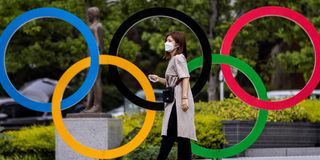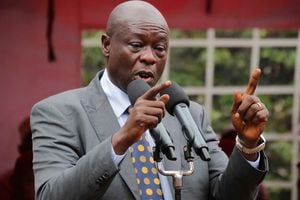Fans banned from Tokyo Olympic Games venues

In this file photo taken on June 3, 2021, a woman stands in front of the Olympic rings in Tokyo. The journey to this year's Olympic Games has been like no other. After a historic pandemic postponement, organisers refused to pull the plug, despite infection risks, travel restrictions and persistent public opposition.
What you need to know:
- Most Olympic competition will happen in Tokyo, but a few events will be held outside the Japanese capital.
Tokyo
Fans will be banned from most Olympic events and Tokyo will be under a virus state of emergency throughout the pandemic-postponed Games, Japanese officials announced Thursday, just two weeks before the opening ceremony.
The decision, described by Tokyo's governor as "heartbreaking," means the Games will be the first to take place largely behind closed doors and is another blow for organisers as they try to build momentum for the event.
When the Games were postponed last year as the scale of the pandemic became clear, there was talk that they would be staged as proof the world had overcome the virus.
But that triumphant tone has given way to the harsh reality of new infection surges and more contagious variants, including the Delta strain that has spooked officials in Japan.
The country has seen a comparatively small virus outbreak and avoided tough lockdowns, but it also moved slowly to start vaccinations, and only about 15 percent of its population is fully vaccinated so far.
With infections rising in the capital, Prime Minister Yoshihide Suga on Thursday announced Tokyo would be under a virus emergency from July 12 until August 22.
The measure is significantly looser than lockdowns seen elsewhere, largely limiting alcohol sales, shortening opening hours for restaurants and capping event attendances at 5,000 people.
But it signals a growing concern about the current rate of infections, and appears to have piled pressure on Olympic organisers who had hoped to have up to 10,000 local fans in venues after barring overseas spectators.
Organisers met Thursday evening with local and national government officials and Olympic and Paralympic chiefs to make what Tokyo 2020 chief Seiko Hashimoto termed a "very difficult decision".
She said spectators would be barred from venues in Tokyo and three surrounding regions, which account for the majority of Olympic events. Rules in other areas will vary, with limited spectators allowed in some regions.
"I feel heartbreaking grief about this decision," said Tokyo Governor Yuriko Koike.
"But please watch the Games at home with your family in a safe and secure manner," she told reporters.
Hashimoto, herself a former Olympian who competed at both summer and winter Games, asked for understanding over the "difficult choice."
"I am very sorry for those people who will be disappointed, but in order to prevent the spread of the virus, this was the only choice available for us to take," she said.
A decision on spectators at the Paralympic Games, which open on August 24, will not be taken until after the Olympics end, organisers said.
The ban comes after Suga announced the new emergency measures, which he said would not interfere with holding the Games.
"We will host the Games under the state of emergency," he told reporters.
"I think we can realise a safe and secure Games by taking these measures."
International Olympic Committee chief Thomas Bach, who arrived in Japan earlier Thursday, said he would "support any measure which is necessary to have a safe and secure Olympic and Paralympic Games for the Japanese people and all participants".
Organisers are at pains to insist the Games can go ahead and will be safe for local residents and Olympic participants.
Japan has so far recorded around 14,900 deaths, despite avoiding harsh lockdowns, but the government has been criticised over the slow start to its vaccination programme.
And there are concerns that the Delta variant could produce a new wave that might quickly overwhelm local medical resources.
Olympic organisers have drawn up extensive measures, including daily testing for athletes and limits on their movement, that they say will keep the public and Games participants safe.
While vaccination is not required to participate in the Games, Bach said Thursday that 85 percent of arriving Olympic delegations would be inoculated, and almost 100 percent of IOC staff and members.
Despite the measures, Tokyo 2020 is struggling to stoke enthusiasm for the Games as the final countdown begins.
A nationwide torch relay has been taken off public roads in much of the country over virus risks, and fans have been asked to avoid the route of the Olympic marathon when it is run in northern Hokkaido.
Polls show most Japanese would prefer the Games be postponed again or cancelled outright, though opposition has softened in recent weeks.




